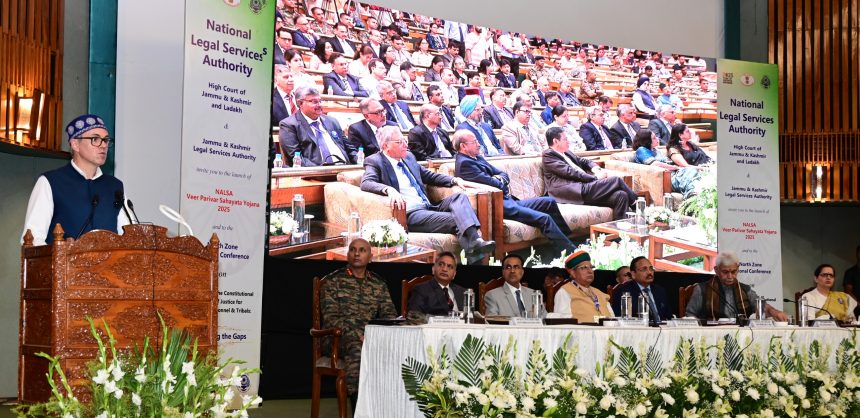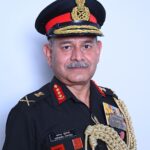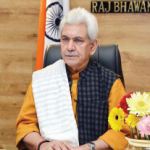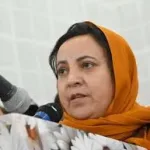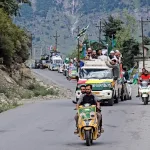Srinagar, July 26: Chief Minister Omar Abdullah on Saturday said that justice in a democracy should not remain a deferred aspiration but must become a lived experience, especially for those who defend the Constitution and for communities long awaiting its full embrace.
Addressing the North Zone Regional Conference of Legal Services Authorities at SKICC Srinagar, the Chief Minister described the gathering as a vital platform to deliberate on the constitutional promise of justice enshrined in the Preamble and Article 39A, which mandates that access to justice must not be denied due to economic or other disabilities.
“The focus on the rights and entitlements of defence personnel and tribal communities reaffirms our collective commitment to ensure justice for those who have served selflessly and those who have been underserved for far too long,” he said. He called on all institutions to meet these needs with “speed, sensitivity, and strength.”
On the solemn occasion of Vijay Diwas, CM Abdullah paid tribute to India’s defence personnel, many from Jammu and Kashmir, who serve in challenging terrains with dedication. However, he highlighted the systemic legal barriers they face, ranging from service-related disputes and pension issues to civil grievances, largely due to geographic remoteness and the mobile nature of military life.
“These challenges certainly amount to ‘other disabilities’ under Article 39A and must be addressed urgently and compassionately,” the Chief Minister asserted. “It is indefensible that those who risk their lives to uphold the Constitution should struggle to access the protections it guarantees.”
He praised the J&K State Legal Services Authority for amending rules to explicitly include serving and retired defence personnel, and lauded procedural reforms introduced by the High Court to ease access to justice for uniformed citizens. However, he stressed that these must mark the beginning of deeper institutional engagement.
“There is an urgent need for coordination among legal service authorities, military legal cells, ZilaSainik Boards, and regimental welfare offices,” he said, urging the establishment of dedicated legal aid clinics in cantonments and districts with significant ex-servicemen populations.
He further emphasised that families of defence personnel, widows, aged parents, and dependent children, deserve empathetic, expert, and timely legal support. “No soldier, or soldier’s family, should be left adrift, unsure of procedural avenues available to them,” he stated. CM Abdullah also recommended training paralegal volunteers in military legal issues and deploying them in high-defence areas, while leveraging technology such as mobile apps and virtual consultations to democratize access.
Turning to tribal communities, the Chief Minister acknowledged Jammu and Kashmir’s rich tapestry of Scheduled Tribes including Gujjars, Bakarwals, and Paharis, who have preserved cultural traditions despite living in difficult terrains. He hailed the extension of constitutional protections such as the Forest Rights Act and Panchayats (Extension to Scheduled Areas) Act as historic legal milestones.
“Our government has augmented development efforts, allocating Rs 98 crore this year for tribal welfare, operationalising six Eklavya Model Residential Schools, and establishing 222 smart classrooms in tribal areas,” he noted. Mobile medical units and a newly commissioned Tribal Research Institute further reflect a commitment to combining dignity with development, though he warned development alone cannot substitute justice.
Further, mobile medical units have expanded healthcare access, and a Tribal Research Institute has been commissioned to better understand and address tribal issues. “These interventions exemplify our commitment to combine dignity with development. However, development alone cannot replace justice,” he cautioned.
The Chief Minister also acknowledged ongoing structural challenges—such as linguistic barriers, geographic isolation, and cultural differences—that limit legal literacy and representation among tribal populations. While praising the operationalization of 255 legal aid clinics supported by 527 panel lawyers and 561 paralegal volunteers, he insisted that more must be done.
“Paralegal volunteers drawn from tribal communities themselves should be trained to provide legal assistance in culturally sensitive ways and in local languages,” he said. He recommended expanding mobile legal aid vans, tele-law platforms, and virtual hearing facilities to bring justice closer to remote villages. “Justice must reach every hamlet—from Poonch to Kishtwar, Rajouri to Karnah,” he added.
Addressing the balance between national security and tribal rights, the CM warned against enforcement measures that result in legal disenfranchisement. He underscored the importance of transparent, timely grievance redressal mechanisms and strengthening alternate dispute resolution forums, including local government bodies, mediation centers, and panchayats, especially for land rights and service entitlements.
“Judicial officers, legal aid lawyers, and field functionaries must be trained in tribal customary law, military jurisprudence, and the ethics of constitutional service,” CM said.
He added that only through cross-learning can the justice system respond effectively to the diversity it serves.
CM also announced the establishment of a dedicated law university in Jammu and Kashmir, with an initial allocation of Rs 50 crore.
“This university will focus on legal instruction, research, and policy innovation particularly in tribal rights, military justice, constitutional law, and environmental governance,” he said. “It is an investment in building an inclusive and capable legal ecosystem for future generations,” he added.
Quoting Mahatma Gandhi, CM said, “A nation’s greatness is measured by how it treats its weakest members.”
He said the true test of the legal system lies in how it serves the most vulnerable, including those who have defended the country and those whose rights have long gone unrecognised.“We must meet this test with humility, clarity, and resolve,” CM said.
The conference was also addressed by Justice Surya Kant Judge of the Supreme Court of India and Executive Chairman NALSA; Arjun Ram Meghwal, Minister of State Ministry of Law and Justice Government of India; Manoj Sinha Lieutenant Governor, Jammu and Kashmir; Justice ArunPalli, Chief Justice of High Court of Jammu, Kashmir and Ladakh; Justice Sanjeev Kumar Executive Chairman J&K Legal Services Authority; Justice Sindhu Sharma Executive Chairperson, Ladakh Legal Services Authority; Lieutenant General Pratik Sharma, General Officer Commanding-in-Chief, Northern Command.
The conference was attended by the members of the Judiciary, MianAltaf Member of Parliament, members of the Armed Forces, representatives of the Tribal Communities, Senior Officers of the Government of Jammu & Kashmir and other States, and members of the Legal Fraternity.


